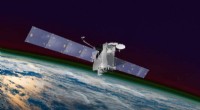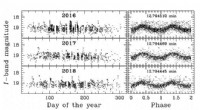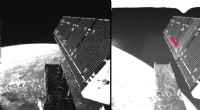
Wetenschap
Hoe moeten de regeringen van de wereld reageren als we een buitenaardse beschaving detecteren?

Deze artist's impression toont het uitzicht vanaf het oppervlak van een van de planeten in het TRAPPIST-1-systeem. Een krachtig laserbaken dat gebruik maakt van huidige en nabije toekomstige technologie zou een signaal kunnen uitzenden dat sterk genoeg is om door buitenaardse astronomen hier te worden gedetecteerd. Als we er een kunnen bouwen, kan een geavanceerde beschaving dat zeker. Misschien heeft ergens een ETI al een signaal gestuurd en is onderweg. Krediet:NASA/ESA/HST
Sciencefiction is het domein waar mensen traditioneel worstelen met het idee van contact met een ETI (Extraterrestrial Intelligence). Maar nu migreren die discussies van sciencefiction naar serieuzere domeinen. Academici gaan heen en weer, één paper tegelijk, over de reactie en geopolitieke gevolgen van mogelijk contact met een ETI.
De discussie is interessant of je denkt dat het waarschijnlijk of zelfs in de verste verte mogelijk is dat de mensheid ooit contact opneemt met een ETI. En het vertelt ons misschien meer over de mensheid dan over een ETI.
Een nieuw artikel met de titel "Geopolitieke implicaties van een succesvol SETI-programma" is het nieuwste salvo in het heen en weer onder professionele denkers. De drie auteurs van het artikel zijn verbonden aan instellingen zoals NASA, het Penn State ETI Center, het Department of Philosophy aan het Spring Hill College en de Harvard Law School. De hoofdauteur is Jason T. Wright van Penn State University. Het artikel is geaccepteerd voor publicatie door het tijdschrift Space Policy , en het is momenteel beschikbaar op de pre-print site arXiv.org.
Dit artikel is een reactie op een eerder artikel dat in 2020 werd gepubliceerd met de titel 'The Search for Extraterrestrial Intelligence:A Realpolitik Consideration'. Dat artikel is ook gepubliceerd in het tijdschrift Space Policy , waardoor een nieuwe nadruk wordt gelegd op de discussie over mogelijk contact met een ETI. De auteurs zijn Kenneth Wisian en John Traphagan. Wisian is van het Center for Space Research aan de Universiteit van Texas, en Traphagan is van het Department of Religious Studies and Program in Human Dimensions of Organizations, ook van de University of Texas. We zullen naar hun paper verwijzen als WT 2020.
In WT 2020 wezen de twee auteurs erop dat veel van het denken rond ETI's gericht is op de risico's van Searching for Extraterrestrial Intelligence (SETI) en Messaging an Extraterrestrial Intelligence (METI). Wat als de ETI technologisch geavanceerd en bedreigend is? Wat als ze net conquistadores zijn of zoiets? Stephen Hawking drukte deze angst goed uit in 2010 toen hij zei:"Zulke geavanceerde buitenaardse wezens zouden misschien nomaden worden, op zoek naar het veroveren en koloniseren van alle planeten die ze konden bereiken."
Dat soort binnenvallende buitenaardse wezens verdienen miljoenen dollars voor Hollywood, maar de auteurs van WT 2020 concentreerden zich op een ander risico, een risico dat niet zoveel aandacht trekt. Wat is dat risico? "In het bijzonder wordt het risico van het louter detecteren van een buitenaards signaal van passieve SETI-activiteit meestal als verwaarloosbaar beschouwd", schrijven ze.
Wat is er zo riskant aan alleen het detecteren van een signaal? Wij en onze realpolitik.
Als je niet bekend bent met de term realpolitik, de geschiedenis staat vol met voorbeelden. Merriam-Webster definieert realpolitik als "Politiek gebaseerd op praktische en materiële factoren in plaats van op theoretische of ethische doelstellingen." In WT 2020 gebruiken de auteurs deze definitie van realpolitik van historicus John Bew:"... de visie op relaties tussen staten waar 'het idee dat de staat door de wet kan worden gereguleerd of gecontroleerd [is] gebrekkig' en dat 'macht gehoorzaamt [s] alleen meer kracht.'"
Realpolitik is de down-and-dirty, kernachtige politiek tussen politieke groepen, meestal naties. Realpolitik staat los van de oratie die politieke leiders gebruiken bij verkiezingen en openbare situaties, waarbij leiders politiek theater gebruiken om de bevolking te beïnvloeden en hun doelen te bevorderen. Realpolitik gaat over de mechanica van macht in onze wereld.
Een mooi voorbeeld van realpolitik komt uit de Tweede Wereldoorlog. De Amerikaanse president Roosevelt en de Britse premier Churchill speelden aardig met Stalin en Rusland. Ze noemden Stalin een bondgenoot, schudden hem de hand en glimlachten toen ze hem ontmoetten. Ze hadden Stalin nodig om te blijven vechten en Hitler te verzwakken, en de Amerikanen stuurden zelfs een gestage stroom voorraden naar Rusland om hun oorlogsinspanning mogelijk te maken. Op het eerste gezicht allemaal goed, zoals deze beroemde clip van de conferentie van Jalta laat zien. Om 2:35 kunnen we zien hoe de drie leiders aardig met elkaar omgaan.
Maar achter de schermen spinde realpolitik een ander web. Churchill en Roosevelt hadden Stalin nodig om de oorlog te helpen winnen, en dat wist Stalin. Stalin beloofde na de oorlog democratische verkiezingen voor Polen omdat hij de bondgenoten nodig had om hem te helpen Duitsland te verslaan. Hij kwam daarop terug zodra de oorlog voorbij was, Polen en andere landen bezette, en Rusland en het Westen werden openlijke vijanden. Dat is allemaal realpolitik, en Stalin deed het goed.
Maar dat was lang geleden, en de wereld was in oorlog. Waarom is het relevant voor onze modernere tijd en het mogelijke contact met een ETI?
Omdat de menselijke natuur niet is veranderd.
Als we passief een signaal van een ETI detecteren, kan dat verontrustend zijn voor religieuze mensen. Hun wereldbeeld zou ernstig kunnen worden bedreigd, en er kan een aanzienlijke omwenteling zijn in religieuze landen of zelfs religieus extremistisch geweld. Maar het zou afzwakken, het denken gaat, en de mensen zouden terugkeren naar hun dagelijks leven. Het zou revolutionair zijn voor wetenschappers, maar de meeste mensen zouden verder gaan met hun leven. Zo vat de WT 2020-paper het denken samen. Maar hoe zouden landen en hun politieke leiders reageren?
Maar wanneer naties met elkaar wedijveren, zal er enige mate van realpolitik zijn. En als het gaat om contact met een ETI, biedt het monopoliseren van dat contact potentiële voordelen voor de natie die het monopoliseert. "De geschiedenis van internationale betrekkingen bekeken door de lens van de realpolitik-traditie van realistisch politiek denken suggereert echter dat er een meetbaar risico is op conflicten over het waargenomen voordeel van monopolietoegang tot ETI-communicatiekanalen", schrijven de auteurs in WT 2020. "Met deze mogelijkheid moet rekening worden gehouden bij het analyseren van de potentiële risico's en voordelen van contact met ETI."
Voor Wisian en Traphagan ligt het gevaar in wat we onszelf zouden kunnen aandoen.
Elke ETI zou waarschijnlijk een enorm technologisch voordeel hebben ten opzichte van ons, en zolang de ETI niet kwaadaardig was, biedt dat voordeel een kans voor landen. Als een overheid de communicatie met het ETI monopoliseert, kan het een technologische voorsprong krijgen. Imagine China, Russia, or the U.S. coveting that technological advantage. Or North Korea, Iran, etc. This is the realpolitik lens that the authors are examining. It could lead to conflict or other undesirable consequences.
In WT 2020, the authors say that realpolitik considerations should be important in planning for successful passive SETI. They make several recommendations. They suggest that scientists working in SETI form supportive relationships with local law enforcement, strengthen the perimeters and security of their institutions, and strengthen personnel security for scientists and their families. The WT 2020 authors also suggest that observational facilities like radio telescopes adopt security measures similar to those of nuclear power plants.
But the new paper, which is a rebuttal to the WT 2020 paper and their realpolitik concerns, doesn't see these security actions as helpful. They also disagree that it's likely any nation could somehow monopolize communications with an ETI.
"While we do not dispute that a realpolitik response is possible, we uncover concerns with W&T's presentation of the realpolitik paradigm," the authors write. They say there are flaws in the WT 2020 analysis and that "… sufficient reason is not given to justify treating this potential scenario as action-guiding over other candidate geopolitical responses."
If a realpolitik response does come into play, it could be the most relevant response. The new paper's authors agree with that much but show that "… it is highly unlikely that a nation could successfully monopolize communication with ETI." The more realistic threat is that a nation thinks it could monopolize communications.
The authors criticize other aspects of the WT 2020 realpolitik scenario, too. For example, if it's a western democracy that detects a signal, could it monopolize it? Unlikely, according to the authors, since western science is well-integrated internationally. Our most powerful observatories have multiple nations and institutions as partners, so monopolization seems doubtful. The scientific community runs on openness, not informational protectionism.
The authors also criticize the sample contact scenario in WT 2020. WT 2020 contends that contact that seems trivial to an ETI could contain valuable technical information that could be useful to a monopolizing nation. This is unlikely. "That this could happen is not obvious at all. First of all, science is cumulative and nonlinear:for a new insight to be useful, we must first have the appropriate scientific context to understand it," they write. Could medieval scholars make use of a textbook on nuclear weapons design? If they could understand it, could they act on it? Not likely, according to the authors, and the same is true of advanced technological information from a highly-advanced ETI.
Also, what specific technological advantage could be gained? We already have enough nuclear weapons to destroy civilization. We have bioweapons, too. Could an ETI unintentionally share information that could allow the monopolizer to build some sort of super-weapon? According to the authors, this is drifting into the realm of science fiction and leaving realpolitik behind.
For the authors, the best way to prevent state actors from even thinking they may gain a monopoly is through openness rather than stricter security and state policing measures. In fact, the measures urged in WT 2020 could precipitate precisely what they're trying to avoid:a realpolitik nightmare.
In their new paper, the authors explain this clearly:"Finally, it is important that implementing extensive security protections in the SETI and METI fields could itself cause the very problems W&T warns about. The existence of hardened facilities and locked-down information flows could itself be interpreted by outsiders as evidence that some world-altering activity was occurring within that community or facility, thus leading to exactly the kind of espionage and conflict that W&T are trying to avoid in the first place, even if nothing had actually been discovered."
There's some agreement between the papers about the risks inherent in contact. "W&T's legitimate worry is that the mere perception of an information monopoly could be enough to generate dangerous conflict," the authors of the new paper write. History shows us that antagonistic nations can be paranoid, engage in saber-rattling, and even launch pre-emptive strikes if they think they're in danger. With all the unknowns around potential contact with an ETI, the worry and fear would be more difficult for some societies to bear than others. There would be flashpoints.
Another point of agreement concerns the security of scientists working on contact with an ETI. "However, even if we have good reason to avoid extensive security protections of facilities per se, there remain other reasons to enact security measures meant to protect the SETI practitioners themselves, especially in the event of detection," the authors write. These scientists could very well become targets of harassment and even assault. There are a lot of crazies out there, as the COVID pandemic showed us, and a rising tide of anti-science thinking.
In their conclusion, the authors say that "… a realpolitik response to a contact scenario is worth considering, but we maintain that it is just one of the various candidate post-contact responses that merit consideration."
They suggest that there are much better alternatives and involve responses "… that might generate cohesion or greater collaboration at the level of international relations."
They also say that the WT 2020 paper relies on the premise that political leaders will misperceive the potential for contact with an ETI to be manipulated by another state. While that fear isn't unfounded, according to the authors, and it needs to be considered, the authors of this paper disagree with the recommendations given in WT 2020.
What do they suggest the world should do when we contact an ETI?
Instead of hardening security at SETI sites, the authors "… recommend transparency,
data sharing, and education of policymakers."
Stel je voor dat. It doesn't make for good science fiction, but it might prevent us from struggling with each other.
 Onverwachte nieuwe dynamiek voor grote DNA-moleculen in vloeibare suspensie
Onverwachte nieuwe dynamiek voor grote DNA-moleculen in vloeibare suspensie Oude enzymen de katalysatoren voor nieuwe ontdekkingen
Oude enzymen de katalysatoren voor nieuwe ontdekkingen Een nieuw elektrolytontwerp dat de prestaties van Li-ionbatterijen zou kunnen verbeteren
Een nieuw elektrolytontwerp dat de prestaties van Li-ionbatterijen zou kunnen verbeteren Suikerachtige geheimen van een kankergerelateerd eiwit
Suikerachtige geheimen van een kankergerelateerd eiwit The Effects of Waters Polarity on Living Things
The Effects of Waters Polarity on Living Things
Hoofdlijnen
- Degradatie van Cheek Cellen
- Een pittige oplossing voor het herstellen van oesterriffen
- Hoe jaarrond gewassen de vervuiling van de boerderij in de Mississippi-rivier kunnen verminderen
- Celcontacten in embryonale ontwikkeling bepalen cellulair lot
- Routes uit isolatie voor Yellowstone grizzlyberen
- Getrainde haviken schrikken kleinere vogels af, trek blikken in LA
- Computersimulaties onthullen wortels van resistentie tegen geneesmiddelen
- Wetenschappers stellen efficiëntieregels voor om het gebruik van nieuwe technologie voor het bewerken van genen te verbeteren
- Lymphatic System Science Activities
 Synthetische synaps bootst dynamisch geheugen na in menselijk brein
Synthetische synaps bootst dynamisch geheugen na in menselijk brein NASA telt af tot de lancering van het eerste ruimtevaartuig dat Sun . aanraakt
NASA telt af tot de lancering van het eerste ruimtevaartuig dat Sun . aanraakt Help de locatie te vinden van nieuw ontdekte zwarte gaten in het LOFAR Radio Galaxy Zoo-project
Help de locatie te vinden van nieuw ontdekte zwarte gaten in het LOFAR Radio Galaxy Zoo-project Team ontwikkelt in vivo flexibele grootschalige geïntegreerde schakelingen (met video)
Team ontwikkelt in vivo flexibele grootschalige geïntegreerde schakelingen (met video) Volledige serotoninereceptorstructuur voor het eerst gezien
Volledige serotoninereceptorstructuur voor het eerst gezien Hoe de dichtheid van water te verhogen
Hoe de dichtheid van water te verhogen AI als bemiddelaar:slimme antwoorden helpen mensen te communiceren tijdens pandemie
AI als bemiddelaar:slimme antwoorden helpen mensen te communiceren tijdens pandemie Onderwijs met winstoogmerk is de belangrijkste oorzaak van de studentenschuldencrisis in Amerika
Onderwijs met winstoogmerk is de belangrijkste oorzaak van de studentenschuldencrisis in Amerika
- Elektronica
- Biologie
- Zonsverduistering
- Wiskunde
- French | Italian | Spanish | Portuguese | Swedish | German | Dutch | Danish | Norway |

-
Wetenschap © https://nl.scienceaq.com






